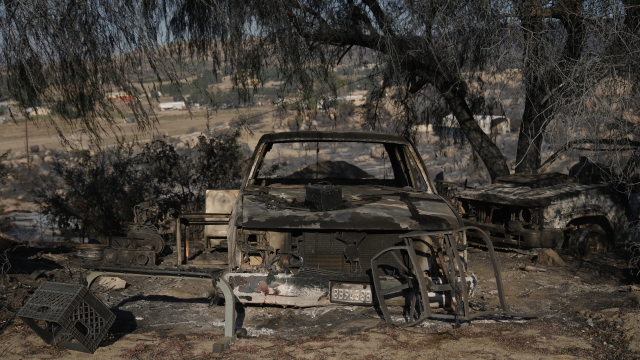The Marshall Fire razed an entire neighborhood near Boulder, Colorado, in late 2021.
State insurance officials estimate up to 85% of those homeowners were underinsured. It's a problem elsewhere in the U.S. too.
"The First Street Foundation estimates that approximately 39 million homes in the country are underinsured. They describe it as an insurance bubble that we are living through right now, largely attributable to increasing climate change risk," said Justin Angle, co-author of "This is Wildfire."
It gets even worse for some homeowners: People in states prone to natural disasters like California and Florida now have a harder time getting any new coverage.
"People who have been able to get insurance are now not. State Farm and others are pulling out in markets like California where they're just refusing to renew policies, because they're deeming them too risky," said Angle.
Angle's podcast on wildfire won an Edward R. Murrow award. He went on to co-write a book on how to prepare and protect from fire.
The book has a section about climate change's effects on insurance, and how bad fire years correlate with other natural disasters like tornadoes and hurricanes. For example, in Lahaina, Hawaii, hurricane-force winds combined with downed power lines and dried out vegetation.
SEE MORE: Hawaiian Electric's insurance covers very few Maui fire claims
"All of these risks of various types of natural disasters are correlated and increasing in frequency. And that presents a real problem for the insurance market. There's fundamental questions as to whether insurance as we know it is a sustainable business," said Angle.
The cost to insurance companies has skyrocketed over the years. Insurance agencies get their own insurance coverage, called reinsurance, to cover the risk of catastrophes. Those reinsurance rates have risen dramatically, too.
Angle says from 1964 to 1990, U.S. insurers paid out on average about $100 million a year for wildfires. Over the next 20 years, that number rose to $600 million a year. By 2018, wildfire insurance payouts were averaging almost $4 billion annually.
"The only way they can afford that is if they're either insuring more people or charging existing customers more. There's really no other way," said Mark Friedlander with the Insurance Information Institute.
It's not as easy as just charging more. Most states require insurance companies to apply for permission in order to increase rates. In states prone to disaster, some companies are pulling out altogether if it's too hard to raise rates to meet their bottom line.
SEE MORE: Right turn on red? With pedestrian deaths rising, cities consider bans
In California, the number of homeowners told their policy wouldn't be renewed jumped by 42% between 2018 and 2019.
It's not just wildfires making it hard to get coverage. Several major insurers left the Florida market this year because of extreme weather events like hurricanes and flooding escalated by climate change.
Insurance Information Institute data shows about 20% of Florida homeowners don't have any property insurance, and that rates rose 42% in one year.
"Most people without insurance are low-income families or retired families on fixed incomes. They have minimum means to spend on rebuilding or repairing the property where they live," said Friedlander.
Without insurance, most lenders won't hand out loans. If you can't get insured there are fair plans, which are state-mandated property insurance programs. They're usually used as a last resort and only offer basic coverage.
"It's not enough. These are not sustainable plans for homeowners in these communities," said Friedlander.
One proposal is to pool natural disasters as a broad category and create a nationalized natural disaster insurance program.
No matter the solution, Angle says it's going to take collective action.
"Everybody has to be part of the solution ... You can't just say the insurance companies or state government and federal government ... everybody has to be aligned here," said Angle.
There's finger-pointing in all directions — but no matter who you blame it's impacting millions of people.
Trending stories at Scrippsnews.com



